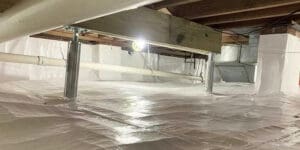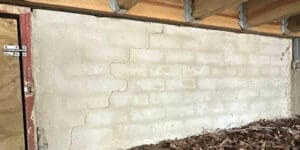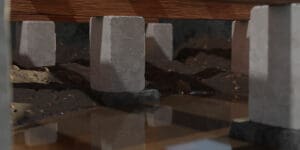Improper grading has an impact on the foundation. As you might expect, water flows backward rather than outwards when it rains. The vast majority of it will end up in the foundation. This water will erode the concrete foundation and cause cracks. The problem will be solved by regrading your yard.
Repairing basement wall cracks isn’t always a simple process. It can be very difficult, necessitating crawl space jacks, push piers, and various other professional tools. Instead of attempting to repair this problem on your own, contact HydroHelp911 to schedule your free foundation inspection and begin working on a basement wall crack repair solution to address your issues.
Reasons for Basement Wall Cracks
SOIL SATURATION
Soil saturation indicates wet ground. The basement had to be backed by footings when it was built. These are situated at the foot of every wall and are in charge of supporting the structure. When the soil beneath these footings becomes overly saturated, the foundations begin to ‘settle,’ which can cause cracks in the basement walls.
When the soil surrounding the foundation gets oversaturated, it will most likely expand. Many foundations are engineered to survive such pressure, so the additional weight of this saturated soil can cause the walls to push inward. When you start noticing the angular cracks in the edges of the walls or windows, this is the time to take notice. What factors contribute to oversaturation? There can be various reasons, such as clogged gutters, improper grading, or the absence of a basement downspout extension or sump pump. Get in touch with foundation repair and waterproofing contractors to check on these downspouts or sump pumps to avoid water leakages that cause cracks in the basement walls.
PRESSURE POINTS
It’s not unusual to come across a few cracks here and there in any basement. They can be enraging for the homeowner, but they are familiar. Pressure points are one of the causes of cracks in the basement walls observed by structural repair professionals. They can occur during installing electric, gas, or sewer lines. This degrades the concrete and increases the likelihood of cracks in the basement or other house parts. They’re also common in the corners of windows, tilting off from the edge, and when performing a foundation analysis, they are the first place we look.
Watch this video to learn more: Hydrostatic Pressure!
DROUGHT
You’re probably wondering how drought could cause cracks in the basement. They can be caused by an excess of moisture in the soil, but remarkably, they can also be caused by a lack of moisture content in the soil. A drought usually steals moisture from the soil, causing the soil to subside. As a result, the foundation walls shift outward, and the foundations settle. This type of drought is common if you have outdoor plants near your foundation; they seek moisture deep in the ground, potentially stealing it from the soil surrounding your foundation’s footings.
SETTLEMENT OF THE FOUNDATION
The foundation will settle after a few years when you build a house. Typically, settling occurs uniformly. However, the foundation does not always sink evenly, resulting in uneven floors. Homes built on loose soil are vulnerable because their tolerance level is determined by the soil type and foundation design.
EARTHQUAKES
Earthquakes cause foundation cracks. Tremors and earthquakes are caused by the movement and collision of tectonic plates deep within the earth. Seismic waves are produced when this occurs, causing the ground to shake. These quakes have the potential to move the layer of soil on which your home is built, causing damage to your foundation.
CONCRETE SHRINKAGE
Pouring concrete is a difficult task that, if done incorrectly, can result in a slew of problems. The technique of casting the concrete comprises a wide variety of factors. Because water is required for the concrete mixture, there is naturally an expansion when wet and a contraction once dry. Various factors, such as the concrete mixture, humidity levels, and the aggregate used can influence how it dries.
ROOTS OF TREES
During the summer, water-seeking roots will travel far and wide in search of water. If there is water under or around your foundation, these roots will make their way there and absorb it. As a result, the soil shrinks and settles. This settlement is what causes basement wall cracks. To avoid this issue, experts suggest removing trees or shrubs too close to the foundation.
INADEQUATE GRADING
If a crack is left unrepaired for an extended period, it will eventually leak. While you can repair only the cracks currently leaking, the repair person will ultimately have to make multiple trips to fix new leaking cracks.
Some cracks can provide less water resistance than others in areas with multiple attempts. That means they’ll be the first to leak.
It is worthwhile to invest to have all cracks repaired simultaneously. That way, you do not have one fixed only to discover that the water has moved on to the next crack.
Basement Wall Cracks FAQs
WILL THE FOUNDATION REPAIRS HAVE AN IMPACT ON MY PLUMBING?
The plumbing pipes are located beneath your foundation and are connected to it. When a slab foundation settles, the lines may become damaged.
It is also possible that your pipes will be damaged when the house is lifted back to its original position. Get a third-party plumbing test performed before or after the foundation repair job is completed for the best results and to minimize damage.
CAN CRACKS ALLOW LEAKAGE?
Cracks in the basement are a frequent thing in many homes. Cracks can be reported along foundation or basement walls, near windows and doorways, and where walls meet. Don’t worry unless they’re more than 1/4th of an inch if you notice them. Most cracks in the basement begin small and expand larger over time. Before you take action, mark and monitor these cracks.
With time, cracks in the basement will begin to leak water, threatening the structural integrity of your home. As a result, it’s critical to understand what causes cracks and repair them.
WHAT ARE FOUNDATION SLAB CRACKS?
Poured concrete slabs are prone to cracking over time. The difficulty is determining why the foundation slab cracked. There are three common reasons for this.
- Concrete Curing: The most common cause is the natural drying, settling, and curing of the concrete slab. This is primarily cosmetic and poses no structural risk.
- Slab Settlement: If your new foundation slab develops settlement problems, you’re in big trouble. This could be due to poor artistry, such as not compacting the supporting ground or poor soil conditions. Immediately contact a professional for an inspection.
- Frost Heave: Crawl space slab foundations at or above grade are vulnerable to frost heave. The water beneath the slab can freeze during freezing temperatures, causing the concrete to buckle.
WHAT IS THE DIFFERENCE BETWEEN HORIZONTAL AND VERTICAL FOUNDATION CRACKS?
- Vertical Cracks: A vertical/diagonal crack appears in the wall when the concrete foundation settles. It’s pretty standard in new construction.
Concrete shrinks as it heals, which is why shrinkage cracks exist. Vertical foundation cracks are most common in the middle of walls. They are only about 1/8 inch wide. Vertical cracks in block foundations are also common. If the damage is closer to a corner than the middle and broader than 1/8 inch, it is usually a sign of a more severe problem. At this stage, a professional basement wall crack repair expert is required.
- Horizontal Cracks: Horizontal foundation cracks are almost always an indication of a more significant problem. These cracks form due to hydrostatic pressure from the outside of the walls.
If left untreated, it can cause the foundation to fail. While foundations are designed to withstand soil and water pressure, severe cracks can form when added pressure occurs due to heavy rains or flooding. As soon as you notice horizontal foundation cracks, contact a basement wall crack repair professional.
HOW LONG WILL IT TAKE TO REPAIR THE DAMAGE?
Repairing foundation cracks typically takes two to three days. However, if the scope of work is more complicated, the time frame may be extended.
You’ll also have to wait a little longer to repair any extra mortar and drywall cracks. The time taken for your wait will be determined by how much your home was lifted.
Typically, you’ll be told to wait four to six weeks after foundation repairs to give your walls time to settle to their new position.
WHAT HAPPENS IF HORIZONTAL WALL CRACKS OR INWARD BOWING WALLS GO UNADDRESSED?
Admittedly, foundation issues do not resolve themselves, and the intensity and possibilities for structural damage only worsen over time.
If ignored, the wall may proceed to bow inwards, impacting everything from the home’s resale value, structure, and your family’s safety. The wall could collapse entirely, rendering your home uninhabitable.




